
British postcard in the Picturegoer Series, London, no. W 523. Photo: United Artists. Montgomery Clift in Red River (Howard Hawks, 1948).

British postcard in the Picturegoer Series, London, no. W 916. Photo: Paramount.

West-German / Austrian postcard by Ufa/Film-Foto, Berlin / HDH, Wien, no. 5955/2. Photo: Columbia. Montgomery Clift in From Here to Eternity (Fred Zinnemann, 1953).
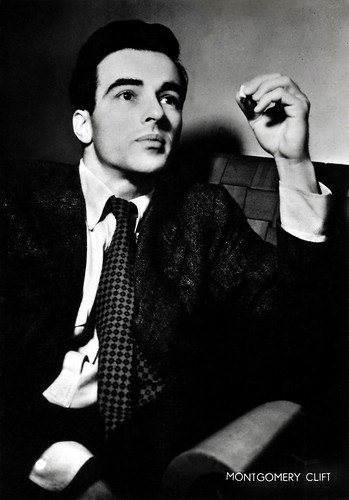
Italian postcard by Bromostampa, Milano, no. 327.

Italian postcard by Bromofoto, Milano, no. 931. Photo: Warner Bros.
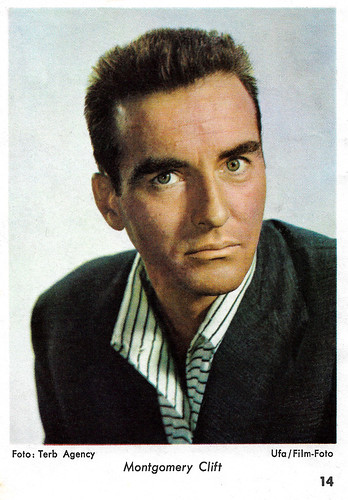
German collectors card by Ufa/Film-Foto, no. 14. Photo: Terb Agency.
An overnight sensation and instant star
Edward Montgomery Clift was born in 1920, in Omaha, Nebraska, USA. 'Monty,' as his family called him, was the son of William Clift, a successful Wall Street broker, and his wife, Ethel.
Clift's early life was shaped by privilege. While his father was away on work, which was often, Ethel led her family on jaunts to Europe or Bermuda, where the Clifts had a second home. In the wake of the 1929 stock market crash, however, the family's situation greatly changed. The Clifts, which included Monty's twin sister, Roberta, and a brother, Brooks, settled into a new, more modest life in Sarasota, Florida.
At the age of 13, Clift started acting with a local theatre company. His mother was impressed by her son's commitment to the stage and encouraged him to pursue his craft. Shortly after the family moved to Massachusetts, the 13-year-old Clift auditioned and won a part in the Broadway play 'Fly Away Home'.
When the family moved again, this time to New York City, Clift earned a second Broadway nod as the lead in 'Dame Nature'. The role cemented Clift, just 17 years old, as a Broadway star. Over the next decade, he appeared in several other productions, including 'There Shall Be No Night', 'The Skin of Our Teeth', and 'Our Town'. Ed Stephan at IMDb: "His long apprenticeship on stage made him a thoroughly accomplished actor, notable for the intensity with which he researched and approached his roles."
For years Clift had resisted calls to jump to the big screen. He was particular about his work and his directors. He finally made the leap with the Western Red River (Howard Hawks, 1948), co-starring John Wayne. His part made him an overnight sensation and instant star. He embodied a new type of man on screen, the beautiful, sensual, and vulnerable man that seemed to appeal to women and men alike. Clift's second film was The Search (Fred Zinnemann, 1948), in which he played an American G.I. in post-war Germany. The film earned him an Academy nomination for Best Actor.
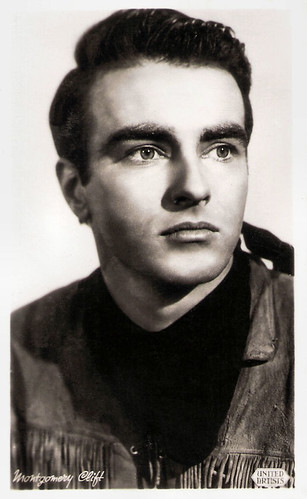
Belgian collectors card by Fotoprim, Brussels, for De Beukelaer, Antwerp, no. A 5. Photo: United Artists. Montgomery Clift in Red River (Howard Hawks, 1948).
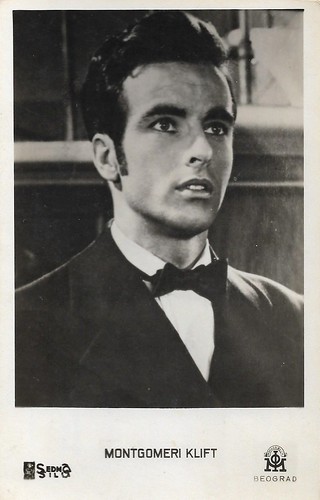
Yugoslavian postcard by IOM Beograd (Belgrade). Photo: Sedmo Silo. Montgomery Clift in the romantic period piece The Heiress (William Wyler, 1949).

Belgian postcard by Nieuwe Merksemsche Chocolaterie, Merksem (Anvers), no C 10. Photo: Paramount.

German postcard by Rüdel-Verlag, Hamburg-Bergedorf, no. 1220. Photo: Columbia. Montgomery Clift in From Here to Eternity (Fred Zinnemann, 1953).

Mexican postcard by Sello, no. 127.

Dutch postcard.
He looked incredible and was a fine actor, a rare combination
The success of A Place in the Sun (George Stevens, 1951) with Elizabeth Taylor, made Montgomery Clift Hollywood's hottest male star and he was adored by millions. He looked incredible and was a fine actor, a rare combination. Over the next decade Clift starred in several high-profile films, including Alfred Hitchcock's I Confess (1953), the box-office smash From Here to Eternity (Fred Zinnemann, 1953), co-starring Burt Lancaster, Frank Sinatra, and Deborah Kerr. In Italy, he filmed Stazione Termini (Vittorio De Sica, 1953) with Jennifer Jones.
For Hollywood, Clift represented an entirely different kind of leading man. He was sensitive, vulnerable, and fearless in the roles he accepted, even if they cast him as a villain. While the film world celebrated his heartthrob status—gossip columnists constantly linked Clift with Elizabeth Taylor, a close friend — Clift and those around him hid the fact that he was gay.
In May 1957 tragedy struck when Clift, driving home from a party at Taylor's California home, veered off the road and struck a telephone pole. The accident devastated Clift, physically and psychologically. He had already been dealing with alcohol and prescription drug problems, and his addictions soared. Over the next decade, Clift continued to work, appearing in seven more films. He received an Oscar nomination for Best Supporting Actor for the role of Rudolph Petersen in Judgment at Nuremberg (Stanley Kramer, 1961), which co-starred Judy Garland, Marlene Dietrich, Spencer Tracy, and Burt Lancaster.
He had so many health problems on the set of Freud (John Huston, 1962) that Universal sued him for the cost of the film's production delays. During the trial, the film opened and was such a huge hit that Clift's lawyers brought up the point that the film was doing well because of Clift's involvement. Clift won a lucrative settlement.
His final role came in the French-German thriller L'espion/The Defector (Raoul Lévy, 1966), in which he played an American physicist working with a CIA agent in Germany to secure the defection of a Russian scientist. Montgomery Clift died of a heart attack at his home in New York City in 1966. He was only 45.

Austrian postcard by Austriapost, Vienna, no. 301. Photo: Columbia. Montgomery Clift in From Here to Eternity (Fred Zinnemann, 1953).
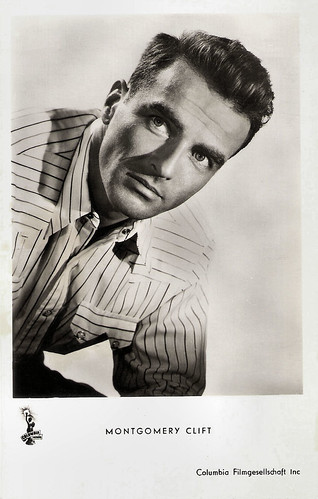
West-German postcard by Kunst und Bild, Berlin-Charlottenburg, no. A 1089. Photo: Columbia. Montgomery Clift in From Here to Eternity (Fred Zinnemann, 1953).
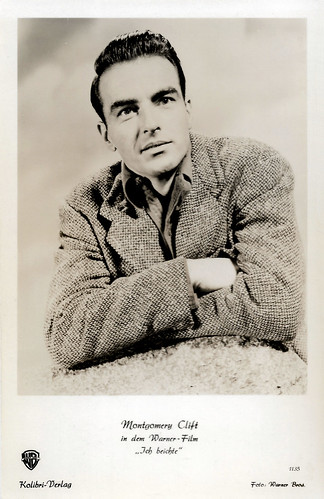
West-German by Kolibri-Verlag, no. 1135. Photo: Warner Bros. Montgomery Clift in I Confess (Alfred Hitchcock, 1953).

West-German postcard by Kolibri-Verlag, Minden/Westf., no 1884. Photo: Warner Bros. Montgomery Clift in I Confess (Alfred Hitchcock, 1953).

German postcard by Ufa/Film-Foto, no. FK 4015. Photo: Centfox.

Czech postcard by Pressfoto, Praha (Prague). Photo: Marilyn Monroe, Clark Gable, and Montgomery Clift in The Misfits (John Huston, 1961). Collection: Carla Bosch.

Dutch collectors card in the series 'Filmsterren: een Portret' by Edito Service, 1994. Photo: The Kobal Collection. Montgomery Clift in Freud (John Huston, 1962).
Sources: Ed Stephan (IMDb), Biography.com, Wikipedia, and IMDb.
This post was last updated on 29 September 2023.
No comments:
Post a Comment